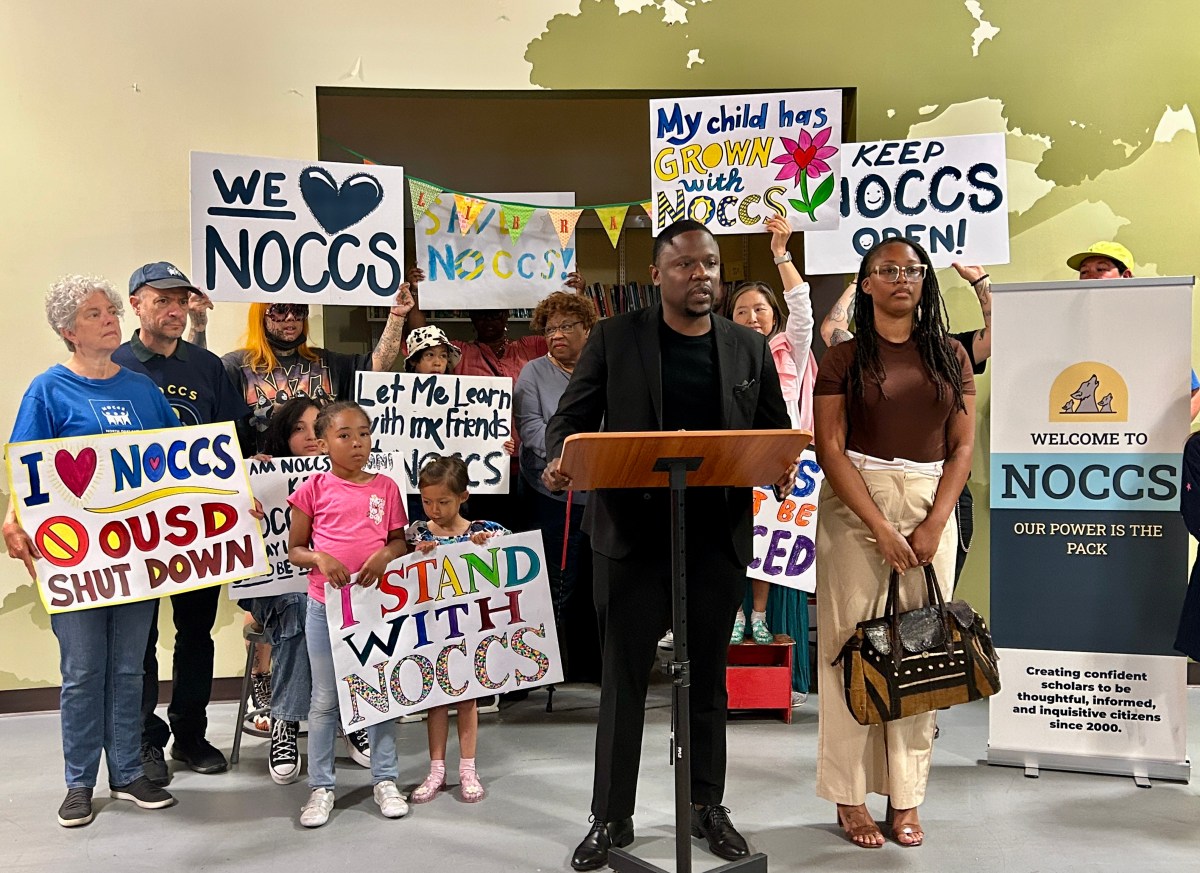School leadership and families gathered in the atrium of the North Oakland Community Charter School on Tuesday to announce a lawsuit against Oakland Unified School District and its decision to revoke the school’s charter.
The lawsuit, filed in Alameda County Superior Court one day after the OUSD board voted to revoke the charter, claims that OUSD is violating the state’s education code by circumventing the normal charter revocation process and that NOCCS has met the academic goals outlined in a 2019 agreement to keep the school open.
“Going into my third year at NOCCS, we have seen a lot of growth in student performance, staff culture, and family and community engagement,” said head of school Jimmie Brown on Tuesday. “We are impressed and thankful for the hard work of our scholars and staff here at NOCCS. We are not closing and we will see you all in the fall for another fantastic year.”
OUSD does not comment on pending legal matters, a spokesperson said.
The board’s decision is related to a memorandum of understanding signed by the school’s leadership and OUSD in 2019 that outlined conditions the school must meet in order to remain open.
Charter schools are public schools operated by appointed boards and charter management organizations. Charter schools in Oakland are typically authorized by OUSD, but a few are authorized by Alameda County or the state. Charter authorizers are responsible for evaluating a school’s charter—the document that outlines the school’s educational program, academic outcomes, demographics, and governance structure—and renewal petitions.
In 2019, NOCCS was going through the regular renewal process and had seen declines in recent years on state standardized tests for some student groups, as well as declining enrollment. Instead of denying the renewal, OUSD approved it with certain conditions stated in the MOU: that NOCCS would close its middle school and increase math and reading scores.
The MOU also stated that if OUSD found that the school had failed to meet the standards in the agreement, OUSD would notify the school, after which NOCCS would voluntarily close. If the school did not voluntarily close, OUSD would revoke the charter and NOCCS would waive all its rights to the normal revocation process, which includes an opportunity to fix the issue, a public hearing, and the chance to appeal the revocation to the county or state.
NOCCS supporters believe that state law dictating the process for revoking a charter overrides the MOU between the district and the charter school.
“We think that the agreement, like the lawsuit argues, shouldn’t be enforced because state law governs a process and procedures for closing a charter school during its charter term, and that is the revocation process,” said Ricardo Soto, the chief advocacy officer and general counsel for the California Charter Schools Association. CCSA is not part of the lawsuit but is offering support and advocacy to the school.
During last week’s school board meeting, students, parents, and supporters appealed to the OUSD board to keep their school open. NOCCS was founded by parents in 2000 as one of Oakland’s earliest charter schools. The school owns its own building on 42nd Street near Adeline and enrolled about 111 students in the 2023-2024 school year. Fifty-one percent of the students at NOCCS are Black, which is more than twice as high as Black student enrollment in Oakland Unified overall.
Months after the agreement was signed, the COVID pandemic sent students home and shuttered school buildings. The state did not hold standardized testing, and many schools and districts saw students backsliding on academic achievement the following year. Many are still recovering.
In a revised agreement signed in December 2020, three categories were monitored for academic improvements: overall reading scores; overall math scores; and specific student groups, like Black students, Latino students, low-income students, English learners, and students with disabilities.
NOCCS was expected to increase scores in two of the three categories relative to students in OUSD district schools. NOCCS scores in reading went from about 32% in 2022 to 40% in 2023; math proficiency dropped from 25% proficient to 12%; and saw increases for Black students and low-income students. In its lawsuit, NOCCS states that it fulfilled the requirements to remain open.
“For those families that need something small, it works. I’m here pleading and asking you to think about what would be best for this community. It’s not one against the other–it’s about us all working together,” said Tina Harambe, a mother of a NOCCS graduate and a community school manager for OUSD. “We need an opportunity to show you that our students’ reading scores are increasing, math scores are increasing, and that there’s change.”
Board directors Jennifer Brouhard, VanCedric Williams, Valarie Bachelor, Mike Hutchinson, and Sam Davis voted to approve the revocation. Director Jorge Lerma voted against it, and Director Clifford Thompson abstained. There was little discussion from the board before the vote.
The NOCCS community is raising funds for the legal fight. Claudette Lee, a retired school principal who has volunteered at NOCCS for the past two years, said her granddaughter, a rising second grader at the school, has excelled academically and loves her peers and the principal. Lee also noted that it’s impossible to turn a school around in two years.
“From the day I walked into that building, I knew it was something special. We just knew that we wanted my granddaughter to attend,” Lee said on Tuesday. “We’re going to fight to keep the school open, and we don’t want to just keep it open for one year. We want this school to stay open forever.”

